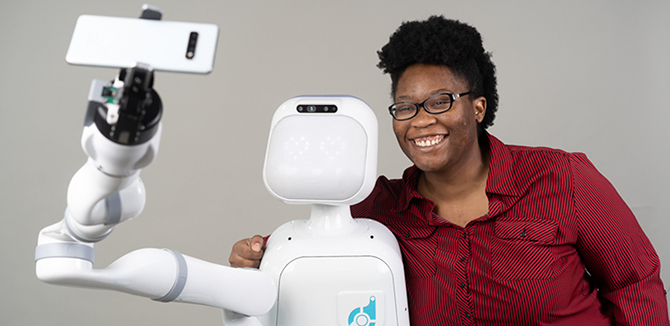Bringing Robot Assistance to Medical Workers
Lauren Hutson (MSR '18) talks about her work at Diligent Robotics and how her company is supporting front-line workers during the COVID-19 pandemic.

When Lauren Hutson (MSR '18) was preparing to graduate from Northwestern Engineering's Master of Science in Robotics (MSR) program, she wanted to find a job that allowed her to use her expertise to meaningfully help people directly. She could accomplish that goal working in healthcare and took a job at Diligent Robotics, an artificial intelligence company that creates robot assistants.
Nearly one year into the COVID-19 pandemic, Hutson said more people are realizing what she believed when she started: robots can be an incredible asset for the healthcare field.
"With social distancing, as well as being short-staffed and underprepared for the influx in patients this past year, hospitals can no longer spare any staff time on non-critical tasks," Hutson said. "Robots became a hot commodity for the amount of time saving they could provide for the staff as well as for the safety aspect of reducing contact and any inter-hospital spread of COVID-19."
Diligent's robot assistants are created to aid healthcare workers with routine tasks so they can focus more on patient care. Moxi, the company's first robot attendant, was deployed at a Texas hospital in 2019 and is currently used in two facilities. Moxi became a key team member at the onset of the pandemic by assisting with non-patient-facing tasks, including gathering patient supplies, distributing personal protective equipment (PPE), collecting items from central supply, and delivering lab samples and medications.
In her role as a robotic software engineer, Hutson helps design and maintain the robots' core features, as well as supporting the operations team when something goes wrong. She routinely finds herself relying on lessons learned during her time in MSR, particularly her experience with the Robot Operating System (ROS).
"We use ROS every day, so already being familiar helped me jump right into doing more interesting work," she said. "Knowing how to debug ROS has helped immensely when trying to solve issues that appear onsite."
Hutson's knowledge of kinematics is also valuable when she evaluates navigation stacks or creates features within the company's manipulation pipeline.
Diligent has been working to create more remote testing tools and remote operation tools since the beginning of the COVID-19 outbreak. Moving forward, Hutson hopes to see robots play an even larger role in healthcare so that physicians and medical workers can focus their time on their most important responsibility: taking care of patients.
"Once hospital robots are more commonplace, I think they could find themselves interacting in a room with patients and serving as mobile record keepers," she said. "There are also large opportunities for robot integration into supply and materials management within hospital wings and complexes."

